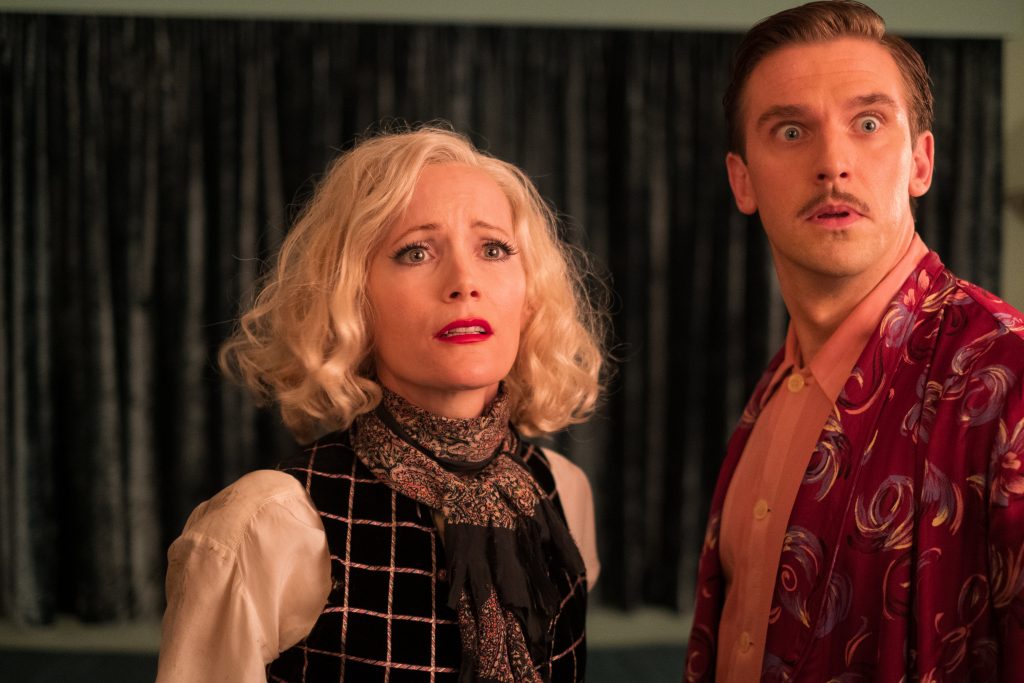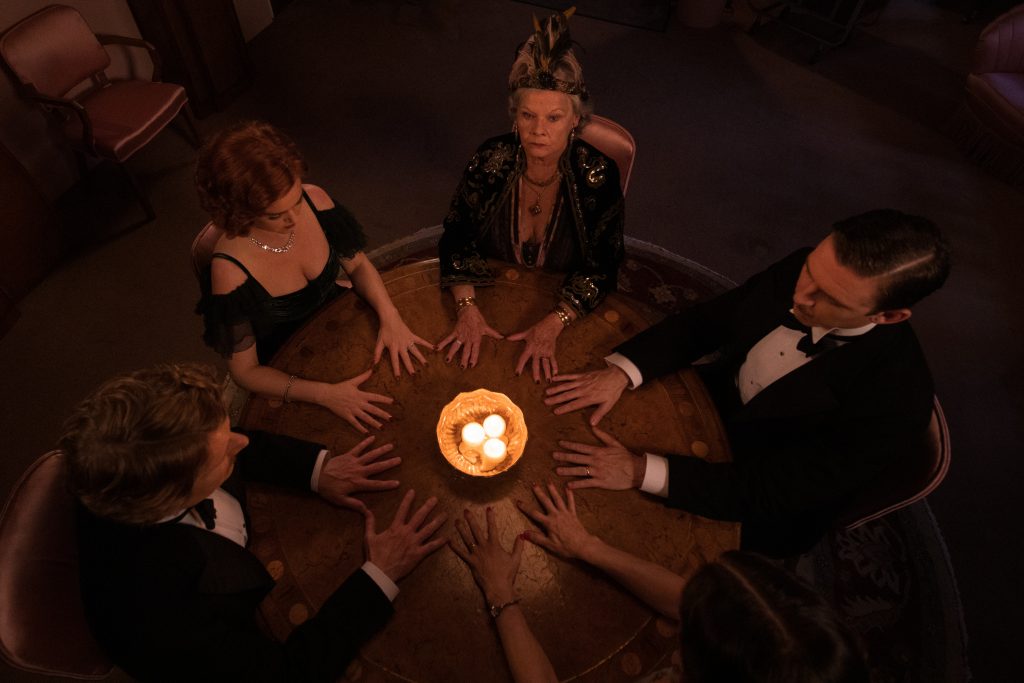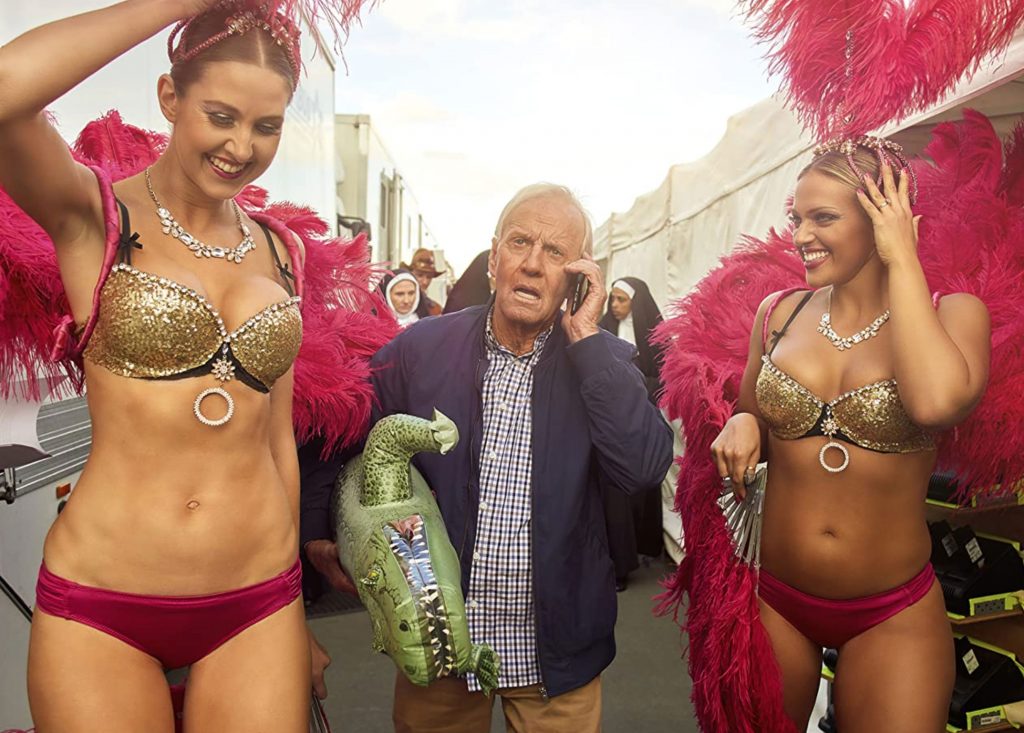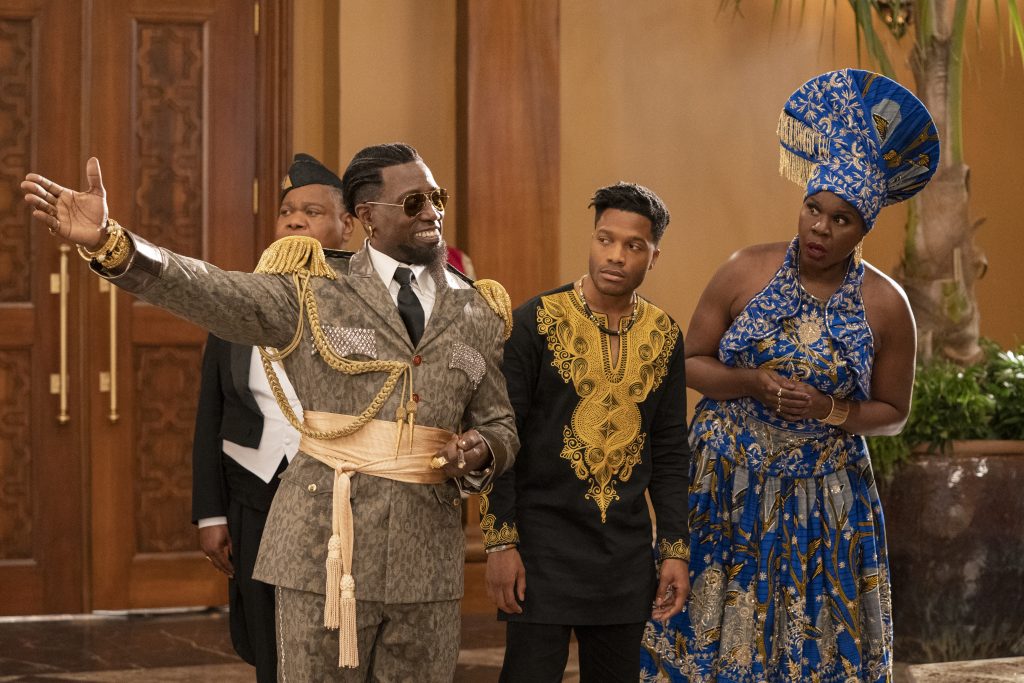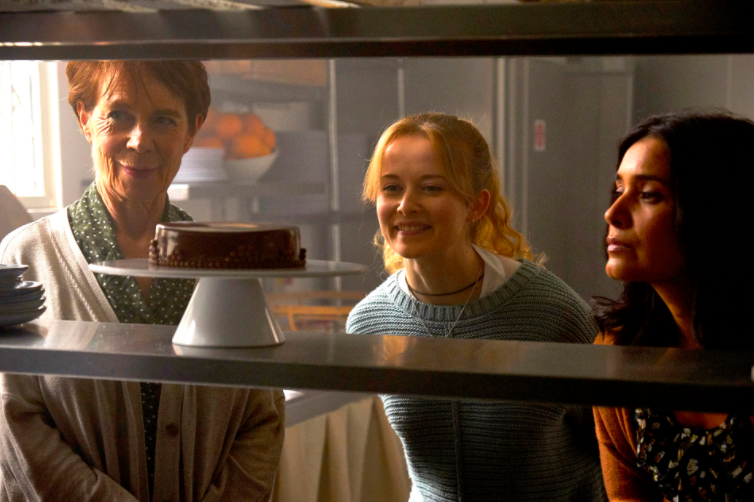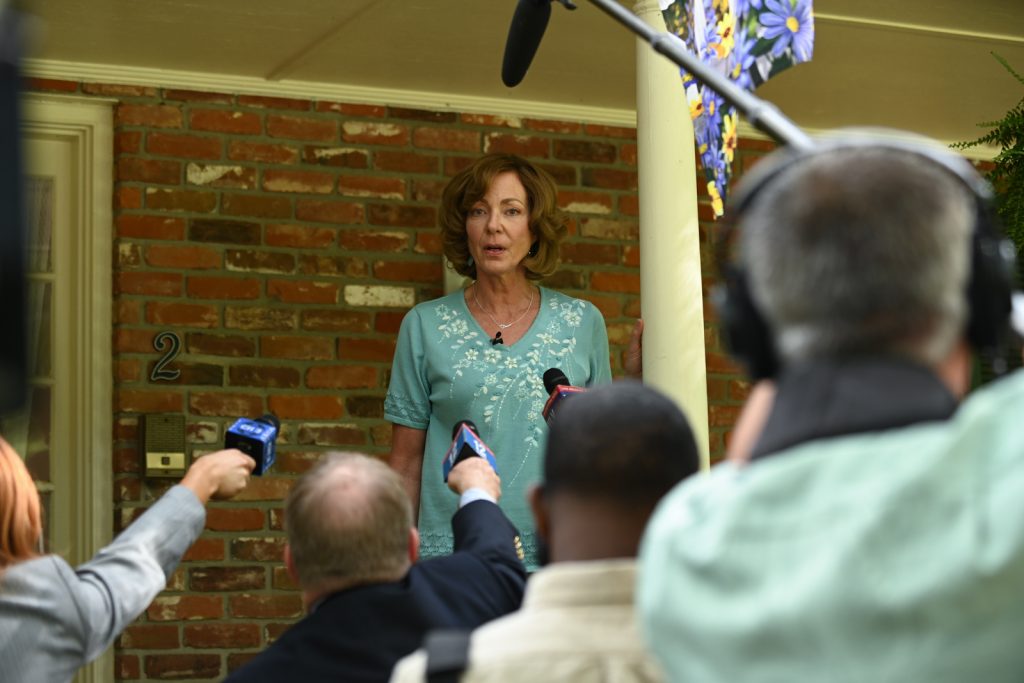April 11, 2021
by Carla Hay
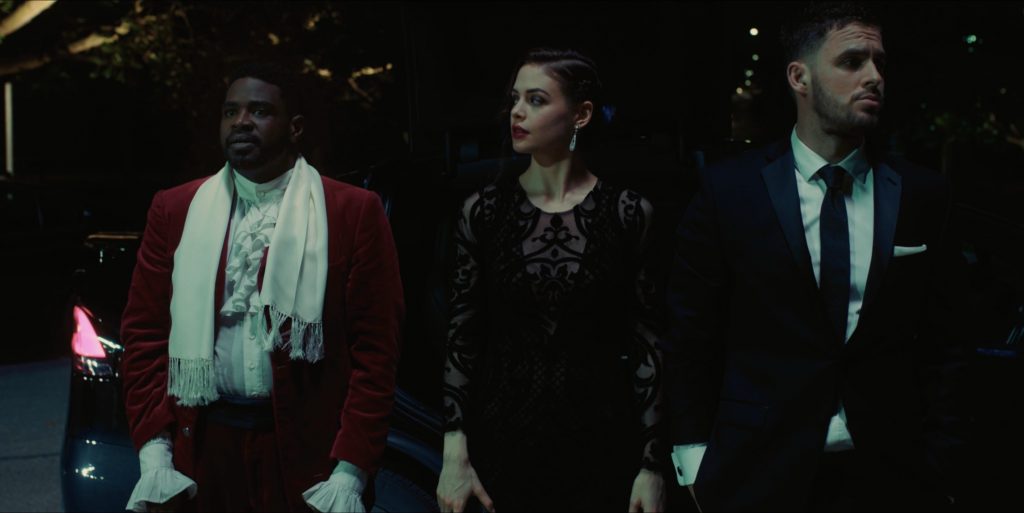
Directed by Alan Ritchson
Culture Representation: Taking place in an unnamed North American city, the action comedy film “Dark Web: Cicada 3301″ features a predominantly white cast (with some African Americans and a few Asians) representing the middle-class, wealthy and criminal underground.
Culture Clash: A bartender who’s a secret computer hacker uncovers a Dark Web secret society of rich criminals called Cicada 3301 and is pressured by law enforcement to infiltrate this secret society.
Culture Audience: “Dark Web: Cicada 3301″ will appeal primarily to people who don’t mind watching a painfully unfunny film that struggles to find anything resembling a coherent plot.
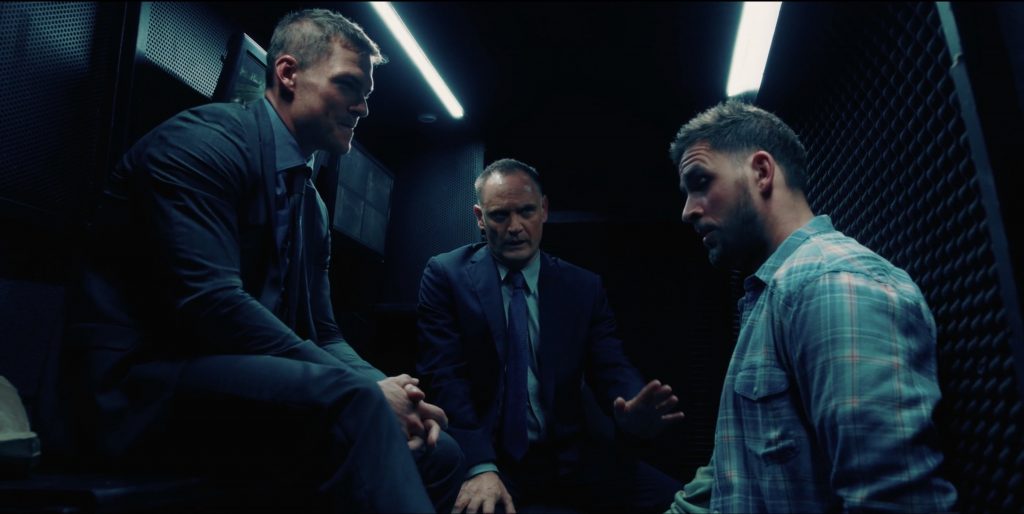
Just like the title of this movie, the action comedy film “Dark Web: Cicada 3301” is vapid and badly conceived. It tries desperately to be a wacky caper film, but the movie’s convoluted plot is filled with cheesy comedy that includes a homophobic fixation on depicting gay male sexuality as something to shamefully ridicule. Almost all of the characters in this movie are unappealing. Good luck to anyone who wastes time watching this incoherent drivel until the very end. Even the movie’s mid-credits scene looks like a throwaway.
Directed by Alan Ritchson, who co-wrote the screenplay with Joshua Montcalm, “Dark Web: Cicada 3301” has a misguided concept that can be described as “Mr. Robot” meets “National Treasure” meets an “Austin Powers” movie. The protagonist of “Dark Web: Cicada 3301” is a computer hacker who’s a loner, but he goes on a treasure hunt as a wisecracking spy for the government. It’s even more cringeworthy than it sounds. At 105 minutes, “Dark Web: Cicada 3301” feels like much longer, as viewers have to watch a lot of nonsense, and most of it still won’t make much sense by the end of the movie.
“Dark Web: Cicada 3301” takes place in an unnamed North American city. The movie was filmed in Canada and has a mixture of American and Canadian actors, but nothing in the movie looks specific to the U.S. or Canada. The name of the federal agency that the law enforcement people work for is also left out of the movie. There’s a lot of things in “Dark Web: Cicada 3301” that are purposely vague, mostly due to terrible screenwriting and direction.
“Dark Web: Cicada 3301” opens with a scene of Connor Black (played by Jack Kesy) in a castle, pointing a gun at someone in a study room, uploading something on a computer in the room, and then destroying the computer. Connor then climbs out the window and over a wall. Suddenly, there’s an explosion that hurls Connor backward. It’s a scene that the movie circles back to later on, to explain how Connor got into this situation.
As the movie shows Connor falling in slow motion, he’s heard commenting in a voiceover: “Believe it or not, I’m falling through the sky like an apple over Newton’s head. Things have been a little fuzzy ever since.” It’s one of the many examples of how tonally off-kilter this movie is. “Dark Web: Cicada 3301” is a mindless action flick, but it also makes these pseudo-intellectual references where people have to know that Isaac Newton is being referenced in this bizarre attempt at a joke.
Throughout the movie, it becomes apparent that the filmmakers of “Dark Web: Cicada 3301” couldn’t seem to make up their minds about what type of audience they want for this movie: Is it the people who like the complex and edgy hacker drama of “Mr. Robot”? Is it the people who like artifact-finding adventures like “National Treasure”? Or is it the people who like deliberately zany spy comedies like “Austin Powers: International Man of Mystery”?
There is some overlap in these audiences, but not much. And the result is that “Dark Web: Cicada 3301” is a tonal mess. Connor Black is written as a strange amalgamation of all three male protagonists in “Mr. Robot,” “National Treasure” and “Austin Powers.” It’s no wonder that Connor is as annoying and confused as he is throughout the movie.
Early on in the movie, it’s shown that Connor is now a prisoner who is testifying on his behalf at a judge’s hearing. The “adventure” scenes of the movie are really supposed to be what happened that led up to Connor being arrested. This movie is so badly made that this scene doesn’t look like it was filmed in a courtroom. It looks like it was filmed in a library or a university meeting room with three tables placed in the room.
At the “defense” table is Connor, who is in a prisoner’s uniform, with his hands and feet cuffed in chains. And he doesn’t have a lawyer with him. Sitting at the “prosecution” table are five men: two attorneys (the one who speaks is played by Joe Bostick) representing the prosecution, as well as the three government agents who offered $5 million to Connor to find a darknet secret society called Cicada 3301. The government agents are leader Mike Croft (played by Al Sapienza), Agent Carver (played by “Dark Web: Cicada 3301” director Ritchson) and Agent Sullivan (played by Andreas Apergis), who all have contempt for Connor.
Sitting at the third table that faces the other two tables is a panel of three judges: Judge Mary Collins (played by Victoria Snow), who does most of the talking; Judge Walters (played by Rothaford Gray); and Judge Bates (played by Marvin Karon). The judges ask Connor to tell his side of the story, which leads to the flashback scenes in the movie. During his “testimony” Connor is very rude to the agents, and he often gets up from the table in a disruptive manner. Connor and the agents also frequently interrupt each other.
Connor sometimes distorts the details in his “testimony,” by telling lies that Agent Carver is a closeted and horny gay man who’s attracted to Connor. For example, there’s a “fantasy” scene from Connor’s imagination where Agent Carter sexually licks Connor on the face. And in another “fantasy” scene, Agent Carter has a dildo strapped on his head after being in an “orgy room” with another man.
Telling these fabrications is Connor’s way of trying to humiliate Agent Carver, who gets upset every time Connor creates a false story about Agent Carter trying to seduce Connor and other men. These fantasies are depicted in the movie for laughs, but it’s not funny to use real or perceived homosexuality as a way to shame someone. “Dark Web: Cicada 3301” over-relies on these so-called “gay jokes” to the point where viewers have to wonder what kind of bigoted hangups these filmmakers have about gay men.
Connor is portrayed as a stereotypical arrogant jerk whom the filmmakers want audiences to think is what you’re supposed to be if you’re a wisecracking, “no filter” action hero. He’s a bachelor in his early 30s who lives alone and works as a bartender. But he’s also a computer whiz who has a photographic memory. And when the government recruits a reluctant Connor to be a spy, he suddenly has combat skills that aren’t really explained in the movie.
“Dark Web: Cicada 3301” uses an annoying visual technique of showing numbers and images on screen, to depict how Connor’s photographic memory works in his brain. The movie never explains why Connor is a bartender instead of working in a computer-related job. Maybe it’s to set up this clumsy plot development in the beginning of the story where Connor starts looking for Cicada 3301. He’s enlisted to be a government spy when government officials find out that he’s close to discovering Cicada 3301, and they want Connor to lead the government to this secret society.
Twenty-nine days before he’s shown falling out from a castle ledge, Connor is at the restaurant/bar where he works. He sees a rude customer give Connor’s waitress co-worker Lori (played by Linnea Currie-Roberts) a measly 50 cents as a tip for serving about three or four people. Before the customer leaves with his dinner companions, Connor steps in and confronts the customer about the insulting tip.
The customer, whose name is William J. Edwards III (played by Benjamin Sutherland), is unapologetic and angrily flicks a lit cigarette at Connor. This triggers Connor to a childhood memory of his abusive father (played by Patrick Garrow) flicking a lit cigarette at him. The movie has more of these flashback memories of Connor’s troubled relationship with his father. (Tomaso Sanelli portrays Connor as a child.) Connor responds to the cigarette-throwing, stingy customer by getting into a fist fight with him.
Later, when he’s at home in his dingy apartment and nursing his bruised knuckles, Connor decides to get revenge on William, the customer he fought with in the bar. Connor remembers William’s full name and goes on his desktop computer to log on to the Dark Web. Connor hacks into William’s Bitcoin and credit card accounts to mess up his credit, and he sends a computer virus to William’s email.
While surfing the Dark Web, Connor stumbles onto mysterious files from an entity calling itself Cicada 3301 that promises a huge treasure worth a fortune, for people who can crack Cicada 3301’s puzzle codes and clues that will lead to the treasure. The group’s logo is a cicada. And it’s implied that whatever “treasure” is being offered is illegal.
Connor is intrigued, but his first attempt at solving a Cicada 3301 puzzle results in him getting a message from Cicada 3301 telling him that he failed the test because he’s not smart enough. This insult causes Connor to get so angry that he smashes a beer bottle, but some of the beer spills onto the computer tower and short-circuits the hard drive. Connor is now more determined than ever to find out who’s behind Cicada 3301 and how to get some of the promised treasure.
Connor needs the money because he’s very close to being evicted from his apartment. Connor has already been served an eviction notice. His deaf landlord Mr. Costa (played by Anselmo DeSousa) threatens to change the apartment’s locks if Connor doesn’t come up with the money. Connor promises that he will have the money by the next day, but even the landlord know that’s a lie.
Connor seems to be fluent in American Sign Language (ASL), because he understands everything that Mr. Costa is saying just through hand signs. (The words hover over Mr. Costa’s head instead of appearing on screen as regular captions.) It’s never explained how or why Connor as ASL communication skills, just like it’s never explained why Connor works in a low-paying bartender job, even though he has advanced-level computer information technology skills.
Because the story in “Dark Web: Cicada 3301” is so jumbled, it throws in a precocious, foul-mouthed kid, and then makes this character disappear for no good reason. She’s a 10-year-old named Sophia (played by Alyssa Cheatham), who lives in the same apartment building as Connor. Sophia is first seen in the movie cursing out Connor for being late with his rent. It’s mentioned later in the movie that Sophia has a single mother (played by Quancetia Hamilton), who spends long hours working away from home. Therefore, Sophie and Connor hang out together a lot, with Connor as Sophia’s unofficial babysitter.
Connor seems to be aware of how odd it might look for a man his age to be spending so much time with a girl who’s not a family member. And so, when he and Sophia go to the library to do some research, there are some moronic jokes made about pedophilia. Connor doesn’t have the money to fix his computer, so he has to use Sophia’s computer or a computer at the library.
While at the library, he meets a sarcastic and pretty library assistant in her 20s named Gwen (played by Conor Leslie), who predictably ends up helping him with this Cicada 3301 hunt. Gwen becomes Connor’s more level-headed sidekick/accomplice. Gwen and Connor have the type of sexual-tension banter that indicates he’s very attracted to her.
But Gwen plays guessing games with Connor about her sexuality. In one scene, Gwen tells Connor that she’s a lesbian. In another scene, Gwen kisses Connor in a romantic way. In another scene, she tells him that she “goes both ways.” In other words, she’s bisexual or queer.
“Cicada 3301” is annoyingly preoccupied with portraying queerness as something to be ridiculed or used as a a homophobic punchline. The third member of this “National Treasure” wannabe trio is Connor’s best friend Avi (played by Ron Funches), who needs a lot of convincing to go on this Cicada 3301 treasure hunt. Avi is used later in the story as sexual bait to flirt with a museum front-desk attendant who’s openly gay, so that Connor and Gwen can sneak into the museum’s book archives while Avi serves as a distraction. All the stereotypical over-the-top gay male mannerisms are used in this scene, such as high-pitched squeals and hand fluttering.
Avi is a college professor of art history who becomes Connor’s reluctant recruit to help solve Cicada 3301’s puzzles, which require extensive knowledge of art history. Avi, who likes to wear bow ties and blazers, is the type of eccentric whose idea of fun is to play chess with old men in a park. Funches portrays Avi as someone with flamboyance and of vague sexuality, although Avi seems to be initially attracted to Gwen. Toward the end of the movie, Avi gets a female love interest named Shauna (played by Jess Salgueiro), whose presence is almost like an afterthought, as if to let viewers know that Avi really isn’t gay.
Avi likes to make cupcakes, and the movie depicts Avi’s interest in cupcakes as “effeminate.” Avi also has the role of the high-maintenance “scaredy cat”/worrier of this Cicada 3301-hunting trio. It’s just another reason for Avi to have more diva-like posturing in the movie, to try to make him the frequent butt of the movie’s not-very-funny jokes.
A lot of the movie consists of Connor, Gwen and Avi gathering clues and solving puzzles. There’s some gibberish about William Blake art, as well as clues that suggest that Cicada 3301 is an Illumniati-type of group. In one preposterous scene, Cicada 3301 has rigged an entire set of street lights to blink out a message in Morse code. Connor conveniently knows Morse Code, so he deciphers the message.
And Connor has some visions that often don’t make any sense. In one of these visions, his 10-year-old neighbor Sophia is seen being taken out of her home on a gurney, with a sheet over her body, as if she’s dead. Her mother is shown wailing next to the gurney. Sophia is never seen in the movie again, nor is it ever explained why Connor had that vision. That gives you an idea how sloppy this movie’s screenplay is.
Connor, Gwen and Avi go through some more shenanigans that eventually lead them to a castle, where Cicada 3301 is having an orgy party that’s trying to go for an “Eyes Wide Shut” masquerade vibe. It goes without saying that there are people in this movie who wear animal masks—and not because it’s Halloween. There’s someone at the party named Phillip Dubois (played by Kris Holden-Ried), whose purpose in the movie is exactly what you think it is. And there are a few twists toward the end of the film that aren’t very clever and aren’t much of a surprise.
The cast members’ performances, which are mediocre, aren’t the main problem in this shoddily made film. The screenplay and direction are the weakest links. At one point in the movie, Gwen says to Connor: “Are you always this grating? It’s like living sandpaper, man!” Ironically, that’s a perfect description for “Dark Web: Cicada 3301.”
Lionsgate released “Dark Web: Cicada 3301” on digital and VOD on March 12, 2021, and on Blu-ray and DVD on March 16, 2021.



